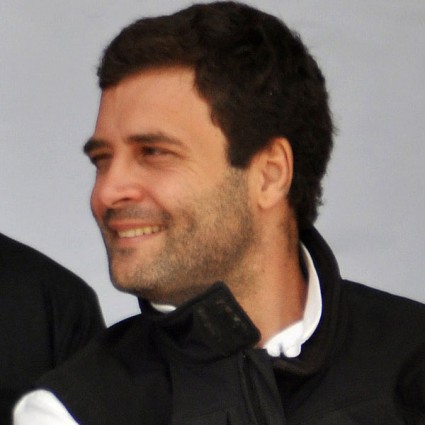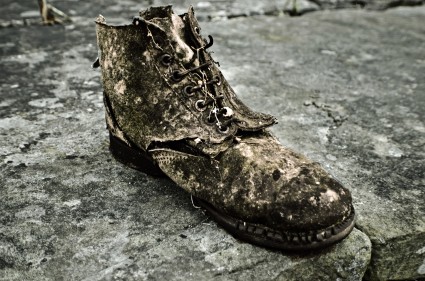Once Pappu said something thought-provoking,
He said, ‘Listen up, I’m not joking,
If you give me hugs
I’ll rid Punjab of drugs.’
A reply came, ‘Woh theek hai. But what are you smoking?’

Once Pappu said something thought-provoking,
He said, ‘Listen up, I’m not joking,
If you give me hugs
I’ll rid Punjab of drugs.’
A reply came, ‘Woh theek hai. But what are you smoking?’

Once there was a man of God.
One day, he declared himself odd
And the next even.
He said, ‘I believe in
My buddy Arvind and his Aam Aadmi squad.’
*
One more:
Once there was a man who was odd.
One day he declared himself God
And said, with a wink,
‘You know, I think
We should aim high when we aim to defraud.’
Once there was a man with a shoe.
He caught a bad case of the flu.
He sneezed so badly,
His shoe flew off madly
Towards Kejriwal when he did ‘Achoo!’

Yogendra Yadav has condemned the shoe attack on Arvind Kejriwal. He has said:
The incident of hurling shoe at Arvind Kejriwal is highly condemnable. This is not the way to oppose anyone.
This kind of anodyne statement is highly condemnable. This is not the way to oppose anything. To make it more interesting, Yadav could have said:
It was a waste of a shoe. There are people in this country who don’t have shoes to wear. Some would even eat a shoe.
Or this:
The shoe was very poorly thrown. I condemn the poor aim. I’ve been watching it on loop, in slow-motion, on my smartphone for the past two hours, and I would have enjoyed it so much more if it had been aimed properly.
Or even:
I applaud the shoe-thrower. Let’s get past political correctness, people. Before you condemn the shoe-thrower, ask yourself this: Is there anyone among you who wouldn’t love to throw a shoe at Arvind Kejriwal?
Ok, I’m just messing around, but really, tell me this: wouldn’t some of these hypothetical statements make you feel warmer towards Yadav than his banal ‘I condemn this, I’m so noble’ nonsense?
This is such a great sentence:
The boy told us that he (his father) was a security officer with the Nizam of Hyderabad’s grandson. His claims are being verified.
That first sentence is funny. The second is just sad. Verify?
* * *
I must try telling a traffic policeman sometime, ‘Tum jaante ho mere sasur ke nanad ke foofa ki bhabhi kaun hai?’
Once there was a great actor.
A fiscal malefactor.
To save his wealth from harm,
He claimed he ran a farm,
But where the fuck is his tractor?
* * *
Oh, and to change the subject entirely, ToI reports that Amitabh Bachchan has “finally broken his silence” on the subject of his name being in the Panama Papers. He has denied having anything to do with the companies he allegedly set up, and has said:
It is possible that my name has been misused.
As an explanation, that’s on the level of ‘The dog ate my homework.’ Points for chutzpah.
Once there was a ceiling fan
Which gave air according to plan.
Now it’s in hiding
While the junta’s deciding
On Rakhi Sawant’s call for a ban.
What is the one thing that all governments in the world, without exception, are great at doing? I have you scratching your head there, don’t I? ‘Amit thinks there’s something governments are actually good at doing? Is this April Fools Day?’
Here’s my answer: they’re all good at redistributing wealth from the poor to the rich.
I have written before about how all interventions in the free market amount to a transfer of wealth from “the relatively poor masses to a specific relatively rich interest group.” The BJP government just provided us a great illustration of that with some new regulations on e-commerce businesses in India. On the face of it, there’s good news, because they’ve finally ‘allowed’ 100% FDI in online retail. But then there’s this:
It also notified new rules which could potentially end the discount wars, much to the disappointment of consumers. This is because the rules now prohibit marketplaces from offering discounts and capping total sales originating from a group company or one vendor at 25%.
This affects many of the existing players adversely. Big Basket, for example, might have to shut down entirely, says FutureGroup CEO Kishore Biyani. Flipkart and Amazon will also face restructuring problems. But forget these companies, and dig a little deeper to see who really suffers here.
We do. Whatever costs these companies face are passed on to consumers. A decrease in competition also affects the value for money that we get. This is axiomatic. Because of these regulations, we will get less bang for our buck. We are, effectively, losing wealth. Where is this wealth going? For this, think about who benefits.
The BJP has long considered small-and-medium-sized traders to be an integral part of its votebank. They were getting adversely affected by online retail, as consumers obviously gravitated towards whoever gave them more value. Traders are an important interest group for the BJP not only because they represent a votebank, but also because they contribute to the campaign coffers of the BJP. And money buys power for what? To make more money.
These regulations benefit these brick-and-mortar retailers and traders, as they will lose less business than they otherwise would because online retailers will be able to offer less value than they otherwise would.
In other words, this is a redistribution of wealth from poor consumers at large to a specific relatively-rich interest group. (Indeed, given the quid-pro-quos involved, you could argue that the party in power is itself the final beneficiary of this transfer of wealth.)
Another data point on how this government is helping this particular interest group: Gujarat has just passed a bill imposing new taxes on all “goods purchased through e-commerce portals.” You know who this hurts, right? You know who this helps?
Governments always carry out such interventions using noble rhetoric of ‘leveling the playing field’ and helping those poor [insert rich interest group here]s. But the beneficiaries here are not owed a living by anyone, and are not entitled to any money apart from what consumers willingly give them in a free market. The money that the consumers would save because of unhindered online retail, after all, would have gone back into the economy in some form. (For more on this, I refer you to the great Frédéric Bastiat’s famous essay, ‘What is Seen and What is Not Seen.’)
* * *
Here’s my three-fold path to evaluating government policy:
1. Ignore the rhetoric.
2. See who it helps.
3. See who it hurts.
It’s the same story, always, every time. It’s the poor who suffer.
* * *
Also read: ‘The Great Redistribution’, my earlier column on this subject, where I use an example where the protagonist and antagonist interest-groups in question are the reverse of the ones in this post, but it’s still the poor who suffer.
In an excellent piece in the Hindustan Times, which mentions the ‘soft Hindutva’ of the Congress, Samar Halarnkar writes:
The facade [of secularism] is now gone. History tells us that when popular governments legitimise hate (fascism and racism are some examples; closer home, the anti-Sikh and post-Babri riots), it is a matter of time before a country’s majority population follows suit. If — or as — that happens, don’t expect much from the party that was India’s secular, political hope.
I have a small quibble here. The chronology is the other way around. It is not that governments (and parties) legitimise hate, and then the people ‘follow suit’. Rather, it is the people who feel that way to begin with, and drive the political parties to act in the way they do. In the political marketplace, demand drives supply. Parties indulge in the politics of hate or bigotry (or just generally identity) because there is a market for it.
Andrew Breitbart once said, ‘Politics is downstream from culture.’ That is true of India as well. The filth that is there in our politics is a reflection of our society.
As for the ‘soft Hindutva’ of the Congress, they indulged in it even before India got Independence, and they clearly feel that there is a large constituency for it today as well. Consider, for example, this. And this.
Whatever pejoratives we apply to our politicians, they are not fools. If they behave in particular ways, they do so because there is demand for it.
Also read: ‘It’s Cascading Trump, It’s Cascading Modi!’, my column from last week on this subject.
The Times of India reports:
In an incident reminiscent of the Dadri lynching, two Muslim men herding eight buffaloes on their way to a Friday market were beaten up and hanged to death from a tree by suspected cattle-protection vigilantes in Balumath forests in Latehar district, 100km from the state capital, early on Friday.
The deceased, Muhammad Majloom, 35, and Azad Khan alias Ibrahim, 15, were cattle traders and related to each other. Their bodies were strung up with their hands tried behind their backs and their mouths stuffed with cloth.
“The manner of their hanging showed that the assailants were led by extreme hatred,” said Latehar SP Anoop Birthary.
This feels like a nightmare, the use of the term ‘cattle-protection vigilantes’ in a news story about a lynching. What has been unleashed here? Who is responsible for this?
The people in power make responsible noises about reforming the economy and increased federalism and blah blah blah. That is all nonsense. Government is just getting bigger and more oppressive, and stealing more from us by way of taxes and cesses. This government is, in every substantive way, left-wing on economics. Many of my friends, who supported them in opposition to the family firm that ravaged our country for decades, are still in denial about this. On economics, on progress, on growth, these guys are as bad as the previous lot.
And in the social domain, they are worse.
It is natural for mass political leaders to draw on baser instincts of identity and tribalism for their popularity. Reason gets you only so far, so you appeal to the reptile brain. Behind the optics of ‘achhe din’, that is the double game the BJP is playing. But it has a cost. That cost includes ‘cattle-protection vigilantes.’
As Prem Panicker writes with regard to this incident:
This is what happens when you let the genie out of the bottle. People die.
For a proximate lesson from the neighbourhood, look at what Zia-ul-Haq unleashed in Pakistan.
Arun Shourie once memorably called this government ‘Congress plus a cow.’ He was almost right.I would call it ‘Congress plus cattle-protection vigilante.’
There is a difference; and it is a horrifying difference.
* * *
Also read: My column from yesterday speculating on the commonalities between the Trump wave and the Modi wave: ‘It’s Cascading Trump, It’s Cascading Modi!’